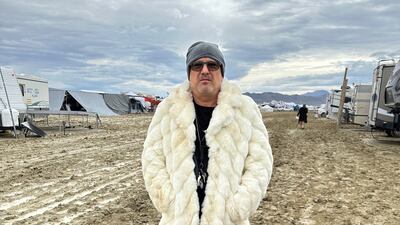A Dubai resident feared he was one day from disaster after being among thousands of people stranded at the Burning Man festival as heavy rain turned the Nevada desert into a mud pit.
Hani Al Malki, who spent more than a week at the event with two friends, told The National how concerns grew as food and water dwindled, with revellers having no way out of the remote site.
Mr Al Malki, chief business development officer at Al Malki Group and a food blogger, said it became “impossible to move” as the festival site and surrounding roads were flooded.
The 58-year-old, originally from Jeddah, travelled to the long-running event on August 27 in an RV and had planned to leave on September 3, one day before the festival's finale, to avoid the worst of the traffic.
He and his friends were able to leave on Monday as rainstorms eased, prompting a mass exodus by festivalgoers.
“The first five days, Sunday to Thursday, it was incredible. We had the best time, the weather was excellent. The conditions were near perfect for the event,” he said.
“On Friday [September 1], the rains started. A little bit of rain is OK, but the problem was it was prolonged rains and very heavy.
“The rains started late in the afternoon and into the evening. I went to sleep and when I woke up, I found the ground was thick, muddy, waxy and sticky, and it was impossible to move any cars and impossible to ride bicycles and it was very difficult to walk.
“When you walked, your boots became heavy, like you were wearing cement blocks.”
The challenging weather meant lorries that typically travel to the site to clear up waste and deliver additional supplies were unable to reach the area.
“It was very, very difficult to move and meant we also couldn't receive supplies,” he said.
“The problem was we couldn't get out, and supplies couldn't get in.
“So we had no choice but to stay put. We could barely even move around from where we were camping.
“The weather forecast said it was going to get better on the Sunday or Monday. By that Sunday, we were still able to manage, we had enough supplies.”
Having attended the festival since 2010, Mr Al Malki said he knew to bring enough supplies.
Supplies running out

But others were facing a race against time.
“Some people were already running out. Most important is water, food, shelter and power,” he explained.
“You really need fuel to be delivered. Help was not sent, because it couldn't be.
'The only way it could be done would be by government on large scale. This would only happen if it was declared a disaster.
“I think one more day of rain and that would have had to happen because we would have run out of everything.
“And the situation would have become dire.”
Mr Al Malki said he and his friend were “much better off than others” who had only tents for shelter from the harsh elements.
“You were told and advised to start conserving and rationing water, energy and food and make sure shelter was in place and help others who may not be in an RV or camper. A lot of people stay in tents,” he said.
“Where we were camping, the preparation and the build was excellent. We were much better off than other people and we are fortunate for that.
“You always have to go prepared for Burning Man. We had enough water, because we knew we were leaving on the Sunday. Had we had to stay until Tuesday or Wednesday due to prolonged rains, nobody would have had enough supplies.
“Everyone would have run out and it would have been a disaster.”
The annual gathering in the Black Rock Desert about 177km north of Reno attracts nearly 80,000 artists, musicians and activists for a mix of wilderness camping and avant-garde performances.
Burning Man was first held in Nevada's Black Rock Desert in 1990 and is one of America's most popular arts and culture events, drawing tens of thousands of visitors each year.
The torrential rain lashed the site, which stretches over 3.5km, in the final days of the festival, when large crowds arrive to see the grand finale, the burning of a giant wooden effigy.

